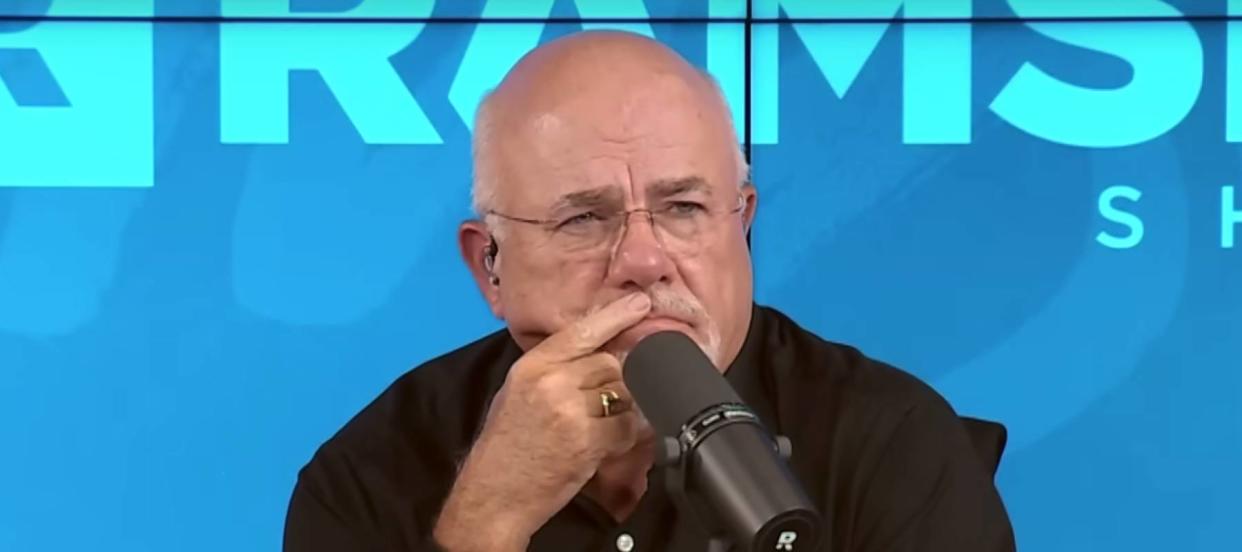‘You’re going to live on beans and rice’: A 73-year-old Arizona woman told Dave Ramsey she has student loans and no savings — 5 retirement catch-up tricks that won’t sacrifice your lifestyle

How late is too late to kick off or kick start retirement savings? The question hung heavy over a recent call on an episode of The Ramsey Show.
A 73-year old Arizona resident named Robin shared that she has no 401(k) or mutual funds and more than $12,000 in outstanding student loan debt — but is considering a home purchase within the next three years.
Don't miss
Millions of Americans are in massive debt in the face of rising rates. Here's how to get your head above water ASAP
Save big on your holiday shopping with an app that’s already saved users $800 million
Find out how to save up to $820 annually on car insurance and get the best rates possible
Host Dave Ramsey then asks a simple question: “How would you be able to buy [a house] if you don’t have any money?” Robin says she expects to pay off the student loan by March of next year and is setting aside a modest amount for a down payment every month.
Ramsey suggests she cash in her insurance policy, pay down her student loan faster and maximize her down payment savings right after. “Basically, you’re going to live on beans and rice for the next three years while you’re going to throw as much money towards buying a home and a nest egg as you can throw.” Based on Ramsey’s calculations, Robin could feasibly achieve this if she lives a long life: to age 95, to be precise.
“The good news is you can actually make a pretty good dent on this,” he says.
Robin isn’t alone. In 2022, the U.S. Census showed that 21% of retirees solely rely on social security and no other retirement savings.
In 2024, there will be more than 71 million Americans collecting Social Security Benefits. This benefit will increase by 3.2% thanks to the Cost of Living Adjustment (COLA), but that only means that payments will increase by about $50 a month.
This benefit alone might not be enough to live off of. Further complicating matters is the fact that, according to U.S. Census data from 2020, nearly half of baby boomers (42%) have little to no retirement savings to rely on as they get older.
If you’re concerned about being in that situation, consider these four ways to boost your retirement savings on short notice.
Downsize
“The largest line item on your budget is going to be housing,” Ramsey told Robin. That’s true regardless of age. As of 2022, the average American household dedicated a third of their total expenses to housing based on data from the Consumer Expenditure Survey.
Selling your primary residence unlocks capital that could boost your retirement savings by a considerable amount. It all depends on how much equity you’ve built up on the property during your years of ownership and whether your home has appreciated in value.
Reinvest dividends
You can boost your passive income by reinvesting it for a short period. A Dividend Reinvestment Plan, or DRIP, can allow you to deploy your regular dividends into acquiring more stock. These programs can expand your nest egg considerably. For example, Walgreens Boots Alliance Inc. (WBA) currently offers a 8.6% dividend yield. Implementing the company’s DRIP program could potentially double your capital in nine years, depending of course on the performance of the stock during that time.
Read more: Thanks to Jeff Bezos, you can now use $100 to cash in on prime real estate — without the headache of being a landlord. Here's how
Tap into insurance policies
Some insurance policies allow you to cash out a certain amount before maturity. If a policy is no longer needed, consider this option to boost your retirement savings — but only as a last resort.
Make sure you consult your tax professional or financial adviser before pulling the trigger.
Tap into home equity
You don’t need to sell your home to realize its value. A home equity line of credit or HELOC could increase your cash flow. If the interest rate on this credit line is attractive, you could use it to pay off debt and reduce long-term expenses.
Move abroad
Based on Social Security Administration data, at least 443,000 Americans have retired and are drawing their Social Security benefits abroad. And many more are considering it.
Countries with lower costs of living could allow you to retire even with a modest nest egg. Many even have better or cheaper health care than the U.S. as well. If any of the other steps on this list are daunting, this alternative could provide both financial and a life adventure.
What to read next
Owning real estate for passive income is one of the biggest myths in investing — but here's how you can actually make it work
The US dollar has lost 87% of its purchasing power since 1971 — invest in this stable asset before you lose your retirement fund
Finish 2023 stronger than you started: 5 money moves you should make before the end of the year
This article provides information only and should not be construed as advice. It is provided without warranty of any kind.
